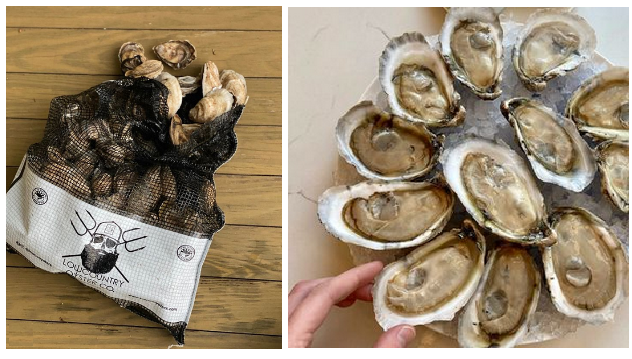The oyster farmer whose product “tastes like great chicken stock.”
Meet Trey McMillan of Lowcountry Oyster Co
It’s easy to spot Trey McMillan. The 34-year-old president of Lowcountry Oyster Co is known for his bushy black beard, so much so that it even made the company logo.
“I’ve had it for a long time, about 16 years, I’m one of the OGs (original gangsters) of it,” he jokes of the beard that is now more commonly seen on hipsters everywhere, from Sydney to South Carolina.
“Originally, it was not going to be our logo but I couldn’t decide on what I wanted. The graphic designer put this one up online and it was a hit.”
“At first it was extremely weird, but now it’s a recognizable thing. I’m kinda shy to be honest with you, so it was strange for me at first, but I think it’s a pretty badass logo now.”
The legendary logo
The logo may not be what you’d expect of an oyster farm, but then again Trey doesn’t have a typical farming origin story so he isn’t tied to tradition.
He was a professional fisherman for 15 years and eventually, he got tired of never being home so he looked for another job. He decided to become an oyster farmer, opening Lowcountry Oyster Co in South Carolina, USA, in 2017.
“What fascinated me about farming oysters was how it was being done in floating cages, I didn’t know it was a thing. I always knew about the bottom cages but didn’t know much about the whole farming aspect and how it’s really similar to dirt-row farms (crops) but it was working on the water and I just jumped right into it, feet first,” he says.
It was a baptism of fire and he “absolutely doesn’t recommend it!”
“I was figuring out the ins and outs, the daily workload, learning how to delegate what needs to be done and I would find myself doing things I thought needed to be done, but it didn’t make a difference and I should’ve been doing something else,” he says.
“Stuff like hosing cages off, I would spend a lot of time with a pump washing each cage individually because I didn’t know it was not necessary if you flip your gear once a week. I didn’t know because I’d never been shown that.”
It was a lot of trial and error on his part, but Trey says that groups such as the East Coast Shellfish Growers Association and other local farmers would help him whenever he had a question.
“There are only a few of farms in South Carolina, it’s not saturated, we know each other pretty well and lean on each other for advice,” he says.
Trey ‘The Beard’ McMillan heading out to the farm
Lowcountry Oyster Co grows the Eastern oyster (Crassostrea virginica) and its signature product is the Lowcountry Cup.
“They’re about three inches, like a cocktail-size oyster and they are very salty year-round. Our normal salinity is around the low 30s, so it’s really salty upfront and has a really smooth buttery finish. It almost tastes like chicken stock,” he says.
To help scale his business, Trey invested in a nursery to create seed. He and a friend built the tanks and silos so that he can develop about five million oysters at a time.
“The way the laws work, we weren’t allowed to import seed from above South Carolina, we were limited to where we could get it from and it’s hard to get. The nursery was a missing link, we can be self-sustaining and also sell seed to other farmers,” he says.
The fantastic finished product. Premium Lowcountry oysters fresh from the farm.
When it comes to managing his farm, Trey has played around with a few inventory systems but always ended up going back to the whiteboard. Nothing had ever really stuck until he started using SmartOysters.
“I was on Instagram looking at a fellow farmer’s feed, North Carolina Oyster Co, and I saw it on there. I really liked the look of the dashboard, I started talking to the farmer about it and he gave me the contact details,” Trey says,
“It’s much easier to read than other systems because you can set it up how you want it. You have a whole overview, you have the dashboard on the computer so you can plan your day out and not just work on the fly out on the farm.
“It saves time and makes it easy to delegate tasks. We have thousands of floating cages in the water and they all look the same. As much as I want to say I put some stuff out and I can remember that I put it over here, in reality I forget where it is so being able to update that in real-life time is a huge advantage. It means we don’t lose our inventory.”





